
WHAT
PAYMENT SECURITY
ContractaPay is a secure platform that facilitates payments between builders, trade suppliers and their customers
Secure System
All funds are held with Australia's largest bank (S&P long term rating of AA-)
Secure Verification
All users are verified using trusted government verification systems
(Australia Post Digital ID for individuals)
(ASIC for companies)
Secure Process
Funds are held for release or return in line with with a clear and secure process
REDUCES RISK
ContractaPay minimises the risk of financial loss for stakeholders by holding in escrow agreed amounts for each project milestone.
Payment Risk
- Reduce risk of late payments
- Reduce risk of non-payment
- Reduce risk of partial payment
Solvency Risk
- Improve recovery rate
- Improve cash flow
- Improve liquidity
Identity & Fraud Risk
- Reduce the risk of fraud
- Reduce the risk of identity theft
- Reduced the risk of ‘man in the middle’
frauds or redirected payments
BUILDS TRUST
ContractaPay provides stakeholders with transparency, control, and for project payments confidence
Improve Visibility
- Monitor Progress
- Monitor Payments
- Monitor Variations
Improve Control
- Agree Project Milestones
- Agree Variations
- Agree Timing
Improve Confidence
- Protection for both parties
- Easy to use
HOW
HOW DOES IT WORK ?
STEP 1
CREATE ACCOUNT
To send or receive funds it will be necessary to open a free account.
Sending funds
If you are sending funds (e.g. a homeowner undertaking a renovation), you will need to verify your identity using the Australia Post digital ID system to ensure compliance with all applicable laws.
Once you have established your account, you can nominate your builder or trade supplier to create an account and an invitation will be issued.
Receiving funds
If you are a builder or supplier of goods, you can open a free account in the name of your company and provide your business address, ACN and bank account details
Once you have established your account, you can nominate your customers and an invitation will be sent by email.
STEP 2
DEPOSIT FUNDS
As a builder or merchant, you can now establish a payment schedule for your customer. A payment schedule may consist of a single milestone or as many milestones as your project or job requires.
Once the schedule has been created, the customer is notified and can view the schedule. The customer deposits the funds, the builder or supplier is notified and work is able to commence or the goods delivered.
The funds on deposit are held in a segregated account in Australia's largest bank (S&P long-term rating of AA-).
Variations
The project milestones, commencement dates, and amounts can be amended or supplemented to allow for
variations or changes to the project works and delivery schedule.
STEP 3
RELEASE OF FUNDS
Completion of work
Once the milestone work activity is completed or the goods have been delivered, the builder or supplier marks the milestone as complete and the funds are automatically released in 7 days time.
Dispute
If there is a dispute between the customer and builder or supplier, the customer can lodge a dispute notice and the payment is put on hold until the work is completed satisfactorily.
Funds deposited against a milestone are held on the account of the homeowner/customer and can be withdrawn at any time prior to the commencement of work under the relevant project milestone. The escrow period for a milestone begins once work has commenced.
Frequently Asked Questions
What service does ContractaPay provide?
ContractaPay is an escrow service provider. This is a financial arrangement where a neutral third party (ContractaPay) holds funds or assets on behalf of two parties involved in a transaction. The escrow agent (ContractaPay) ensures the terms of the agreement are met before the transaction is completed. This approach provides payment security and trust for both parties reducing the risk of non-performance by the payee or payment failure by the payer.
How does ContractaPay work?
step-1: Both parties open an account with the payee (builder or supplier) providing its bank account details to receive payment. step-2: The payee (e.g., builder) creates a payment schedule. For example, the construction of a house might comprise 12 separate payments, including the deposit. These are known as milestones and represent the different stages of construction. step-3: The payer (e.g., homeowner) makes the first payment, and the builder commences work. The funds are held by ContractaPay on behalf of the payer and payee pending completion of the milestone. step-4: The payee completes the work and issues a completion notice. step-5: The payment is released to the payee.
What types of transactions can be handled using ContractaPay?
We handle various types of transactions, including:
• Home & office building
• Building renovations
• Swimming pool construction
• Solar panel installation
• Vehicle & equipment sales
• Business acquisitions
What are the benefits of using ContractaPay?
The key benefits of using ContractaPay include:
Security: The use of ContractaPay protects both parties by ensuring that funds or assets are only transferred when all terms are met.
Neutrality: ContractaPay provides a neutral third party to manage and oversee the payment distribution.
Liquidity risk minimisation: The use of ContractaPay minimises the risk of non-payment or late payments.
Solvency risk minimisation: The use of ContractaPay minimises the risk of loss of funds for payers in the event of insolvency of the payee with funds held by ContractaPay only able to be used for the purpose intended and can’t be used to meet other debts of the payee.
Confidence: Builds trust and confidence between parties by ensuring that agreed-upon conditions are met.
What fees are associated with escrow services?
The fee structure comprises a simple low cost subscription fee for payees (e.g. home builder) with a low rate transaction fee.
How long does the escrow process take?
The duration of the escrow process depends on the number of milestones and duration of the work. Transactions can range from a single milestone for the delivery of goods or the completion of a service to dozens of milestones representing a complex construction contract for example. Funds are only provided on a milestone-by-milestone basis.
How do I start a transaction with ContractaPay?
To use ContractaPay you will need to open an account and verify your credentials. If you are a payee (e.g. builder), you will need to include your account details for to enable the receipt of payments and provide your customer’s email address. We will then send an invitation to your customer to open their own account where they can review the project schedule. If you are a payer (e.g. homeowner) you simply need to include your builder’s details and we will contact the payee and request they open an account.
What details do I need to provide to open an account?
To open an account as an individual you will need to verify your identity using the Australia Post digital ID verification tool. To open a company account you will need to provide the registered company address and ACN.
What happens if there is a dispute?
Following completion of the milestone work activity or delivery or goods, the payee (e.g. builder) will issue a completion notice via ContractaPay. If the payer disputes the quality of work or the goods delivered, the payer will lodge a dispute notice via the platform and the funds will remain held in escrow pending resolution between the two parties.
Is my information safe and secure?
We do not hold any high-risk data such as personal data or financial card data. Bank account details used for payment remittance is encrypted at rest and our systems are regularly audited to ensure the highest ongoing standard of data protection.
Can I track the progress of my escrow transaction?
Yes, the dashboard available via your account will show the status of all milestones and payment activity.
How can I contact customer support?
You can reach our customer support team via
Phone: [Insert phone number]
Email: [Insert email address]
Website:Contractapay.com.au
What happens if one party does not fulfill their obligations?
If the payer (e.g. homeowner) fails to fund the milestone as requested the payee may delay commencement until the funds are deposited into escrow.
If the payee (e.g. builder) doesn’t complete the work to the expected standard the funds will continue to be held in escrow until both parties agree all obligations have been met.
If funds are deposited and work does not commence (e.g. the payee enters administration), the funds will be returned to the payer.
If funds are deposited and work does not commence (e.g. the payee enters administration), the funds will be returned to the payer.
Can escrow services be used for international transactions?
Can escrow services be used for international transactions? Not at this time however we are currently building this functionality for ContractaPay customers.
What if I need to cancel an escrow transaction?
Funds held in escrow will be returned to the payer in the event the payee (service provider) is unable to complete its obligations.
CONTACT
CALL
+61 1300 622 648
(Australian calls only)
MESSAGE
Securely message us by logging in
GPO Box 1939
Sydney NSW 2001
OFFICE
Suite 802, Level 8
50 Clarence Street
Sydney NSW 2000
ABOUT

FIONA
Co-Founder
Fiona has worked in leading law firms for over 15 years as a banking and finance lawyer, on all types of debt deals spanning the property, energy, resources, infrastructure, construction, financial and tech sectors.

ContractaPay
ContractaPay is 100% Australian owned and operated by its founder team.
It combines the founders' experience in banking law, construction finance, payments and program delivery to create and operate a tech enabled platform for payments between builders & trade suppliers and their customers.
ContractaPay
is the trading name of ContractaPay Development Pty Ltd ABN 49 667 875 005
which is a wholly-owned subsidiary of
ContractaPay Holdings Pty
Ltd ABN 49 667 689 847

IAN
Co-Founder
Ian has worked in leading Australian and International banks and FinTechs for over 25 years spanning credit risk, lending, payments, and product delivery.